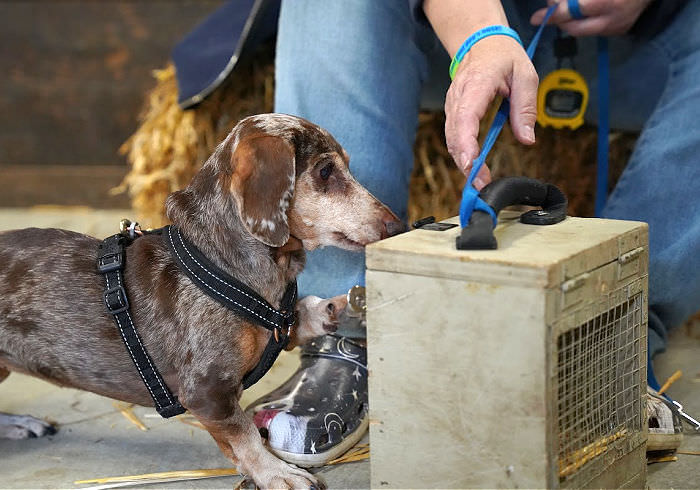Shutterstock
Dogs are intelligent and adaptable, capable of learning an impressive range of skills that can be both practical and entertaining. Teaching your dog new tricks is a rewarding experience for both of you, as dogs are eager learners who thrive when engaging their minds and bodies. From performing life-saving tasks to simply bringing joy with amusing antics, the skills they can master are nothing short of amazing. Dogs love challenges, and their adaptability makes training a fun and fulfilling journey, highlighting how extraordinary and talented our furry friends truly are.
Fetch the Remote
 Shutterstock
Shutterstock
Imagine being comfortably settled on the couch only to realize you forgot the remote. Enter your dog, who has been trained to fetch it for you! Teaching your dog to retrieve specific objects, like the TV remote, is convenient and a great way to stimulate their mind. You can train your dog to recognize and bring you different items on command using positive reinforcement. This skill is particularly helpful for people with limited mobility, and it can also be a fun party trick. Your pup will feel proud to assist, and you’ll get to stay cozy.
Open and Close Doors
 Shutterstock
Shutterstock
Some dogs can be trained to open and close doors, a skill that’s both impressive and useful. Service dogs often learn this to assist their handlers, but any dog can be taught with the right training and guidance. Dogs can use their nose or paws to push or pull doors, and this skill is especially beneficial for people with disabilities. Even in a household setting, a dog that can open a door to let itself out to the yard—or close a door behind you—can make life easier. Just make sure they don’t learn to raid the fridge next!
Pick Up Their Toys
 Shutterstock
Shutterstock
Just like kids, dogs can be taught to clean up after themselves. Training your dog to pick up their toys and put them in a designated bin keeps your home tidy and engages your dog’s brain. Using a series of commands and rewards, your dog will learn to associate putting toys away with positive reinforcement. This skill can turn cleanup time into a fun game, and your pup will be eager to show off their newfound organization skills. Plus, it’s a great way to impress guests and demonstrate how smart your furry friend is.
Detect Medical Issues
 Shutterstock
Shutterstock
Some dogs can detect medical issues, like low blood sugar or seizures before they occur. These medical alert dogs can be life-saving companions for people with conditions such as diabetes or epilepsy. With extensive training, dogs can learn to sense changes in a person’s body chemistry and alert them or others when help is needed. It’s a skill that relies on a dog’s keen sense of smell and intuitive understanding of human behavior. This amazing ability highlights the extraordinary bond between dogs and their owners, proving just how incredible our canine friends can be.
Find Hidden Objects
 Shutterstock
Shutterstock
Dogs love using their powerful noses, and teaching them to find hidden objects can be a thrilling and rewarding game. Whether it’s hiding treats around the house or teaching them to search for specific items like keys, this skill taps into their natural scent-tracking abilities. Dogs excel at scent work, and playing hide-and-seek with objects keeps them mentally stimulated and engaged. This skill can even become a practical asset, helping you locate lost items. Your dog will love the challenge, and you’ll be amazed by their ability to sniff out hidden treasures.
Turn Lights On and Off
 Shutterstock
Shutterstock
Another impressive and practical skill is teaching your dog to turn lights on and off. Service dogs often learn this to assist people with mobility challenges, but any dog can be taught using a light switch extender and some training treats. Dogs can learn to nudge the switch with their nose or paw, providing you with some extra illumination when needed. It’s a fun trick that adds convenience to your life and gives your dog a sense of accomplishment. Just be prepared for your pup to get a little too enthusiastic about their new role as the household light manager!
Carry Groceries
 Shutterstock
Shutterstock
Dogs can be trained to help carry groceries from the car to the house, making them useful shopping assistants. Using a specially designed harness or bag, your dog can carry lightweight items, like a loaf of bread or snacks. This skill is particularly helpful for people who need an extra hand (or paw) and can also be a fun way to involve your dog in everyday tasks. Training your dog to carry groceries requires patience and positive reinforcement, but the result is a helpful companion eager to lend a paw.
Perform Agility Tricks
 Shutterstock
Shutterstock
Agility training is a fantastic way to showcase your dog’s athleticism and intelligence. Dogs can learn to navigate obstacle courses, jump through hoops, weave between poles, and race through tunnels. Agility tricks keep your dog physically fit and provide excellent mental stimulation. The bond between you and your dog grows stronger as you work together to master the course, and the sense of accomplishment your pup feels is undeniable. Even if you don’t plan to compete in agility trials, teaching these tricks is a fun way to keep your dog entertained and healthy.
Alert to Sounds
 Shutterstock
Shutterstock
Hearing dogs are trained to assist people who are deaf or hard of hearing by alerting them to important sounds like doorbells, alarms, or someone calling their name. Even if your dog isn’t a professional service dog, they can still learn to respond to specific sounds. This skill can be useful in everyday life, especially if you live in a noisy environment or tend to miss the doorbell. Your dog will feel proud to have an important job, and you’ll feel more secure knowing your furry friend has your back (or ears).
Perform Cute Tricks
 Shutterstock
Shutterstock
Dogs can learn various cute tricks, from giving a high-five to playing dead. These tricks may not be practical, but they’re undeniably adorable and can bring a smile to anyone’s face. Teaching your dog to do fun tricks like “spin,” “wave,” or “rollover” is a great way to strengthen your bond and show off your dog’s smarts. These tricks are also excellent for socializing your dog and boosting their confidence. Plus, watching your pup perform these endearing acts never gets old, and it’s a surefire way to brighten even the dreariest day.
Retrieve the Mail
 Shutterstock
Shutterstock
Having your dog retrieve the mail is impressive and a fun way to involve them in your daily routine. Dogs with a gentle mouth, like Golden Retrievers, are especially good at this task. Training your dog to fetch the mail from the mailbox or accept it from the mail carrier takes time and patience, but it’s well worth it. Your dog will be thrilled to have a job, and you’ll enjoy their enthusiasm for running this special errand. Just be sure to watch for any overly enthusiastic shredding of your mail!
Provide Deep-Pressure Therapy
 Shutterstock
Shutterstock
Dogs can learn to provide deep pressure therapy by lying on their owner’s chest or lap, a skill that’s especially helpful for individuals with anxiety or autism. The pressure from the dog’s body can be calming and grounding, helping to reduce stress and promote a sense of security. This skill requires training and practice, but the benefits are profound. Dogs who provide deep-pressure therapy are more than just pets; they’re emotional support animals who offer unconditional love and comfort when needed. It’s a beautiful example of how dogs can use their intuition to help humans.
Push a Cart
 Shutterstock
Shutterstock
Pushing a small cart or stroller is a fun skill that some dogs can learn, especially larger breeds. Whether it’s helping with yard work or carrying toys, this skill provides physical exercise and mental engagement. Teaching your dog to push a cart involves patience and positive reinforcement, but the result is a hardworking helper who loves to assist. Your dog will get a kick out of having an important job, and you’ll enjoy watching them strut their stuff with pride. It’s a quirky skill that never fails to impress.
The “Paw-fessor” of Tricks and Skills
 Shutterstock
Shutterstock
Dogs are incredibly talented and eager to learn, making them true “paw-fessors” when mastering skills. From fetching the remote to detecting medical issues, their abilities are a testament to our deep bond and communication. These skills make life more fun and convenient and highlight how special our furry friends are. So, whether your dog carries groceries or performs cute tricks, remember to celebrate their achievements with plenty of treats and belly rubs. After all, a dog’s love and loyalty make every learned skill that much more amazing!



